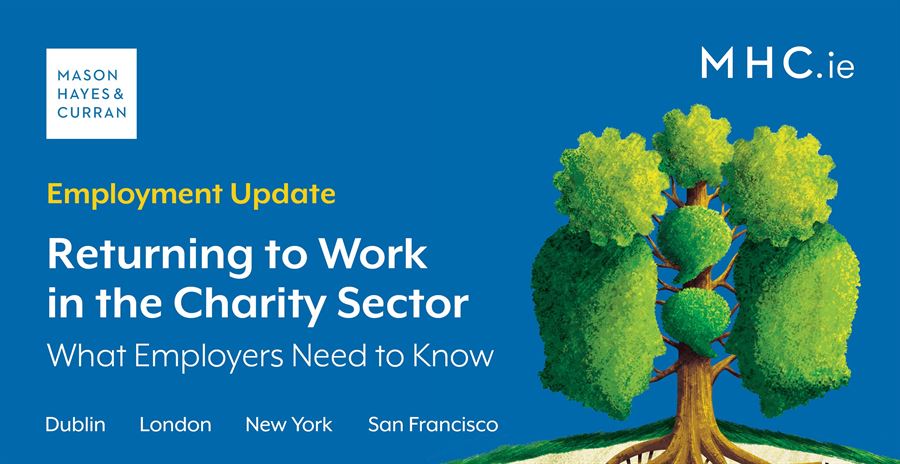
Ireland is in the early stages of recovery from the pandemic which has led to an easing of some restrictions. As of 4 May 2021, the position for employees is that they should continue to work from home unless absolutely necessary to attend the workplace in person. While all employers have a duty to provide a safe place of work, given the nature of face to face work in the charities sector, employers require a robust strategy to combat the risks of COVID-19 transmission.
On 14 May 2021, the Government published a revision of the Work Safely Protocol (the Protocol). It now includes updated guidance to employers on ventilation, vaccinations and antigen testing to protect workers. While the other measures have not been updated since the revision in January 2021, the Protocol should nonetheless facilitate employers in creating a safe workspace for employees to return to.
The Protocol advises employers, workers and/or their recognised trade union or other representatives to continue to have regular engagement around COVID-19 infection prevention and control (IPC) measures in the workplace.
In addition, detailed information is provided on actions to be undertaken so as to reduce the risk of transmission, which can be summarised as follows:
-
Charities should develop and/or update a business COVID-19 Response Plan. The Plan should outline how to deal with a suspected case of COVID-19 in the workplace and include specific measures and responses to deal with an outbreak. It should also identify a response team with the Plan. Employees should be given induction training on the COVID-19 measures in place upon their return to the workplace.
-
Occupational health and safety risk assessments and safety statements should be updated. Risk assessments for the workplace and related activities should be carried out. Particular consideration should be given to the fact that employees in charities will likely be exposed to the public. Employees should also be asked to inform their employers of any particular individual risk factors. It should be communicated clearly to employees that this information is necessary to facilitate a safe return to work.
-
Given that work in the charity sector often involves face to face interactions, it is crucial that work practices are changed or modified to prevent COVID-19 transmission. The rotation of staff across the workplace(s) should be avoided where possible. Employees should be organized into teams and pods that consistently work and take breaks together.
-
Contingency measures should be prepared to address increased rates of worker absenteeism and the implementation of the measures necessary to reduce the spread of COVID-19, e.g. changing work patterns.
-
There is no obligation for charities to implement Rapid Antigen Detection Tests (RADT) testing. However, where a decision is made to introduce it, employees, representatives and Lead Worker Representatives should all be consulted so as to establish which programme of RADT testing is most suited for the particular charity. Employers will also have to give consideration to a process for workers who do not wish to take part in RADT testing.
-
The decision to get a vaccination is voluntary and those working in the charity sector will therefore have to make their own decisions in this regard. Under health and safety regulations, where an assessment shows there is risk to the health and safety of employees due to working with a biological agent for which an effective vaccine is available, a vaccination should be offered. An employee does not have to accept the offer of a vaccination. However, when offering a vaccination, employers must inform the employee of the benefits and drawbacks of both vaccination and non-vaccination. Employees can then decide whether to avail of the vaccination or not. If an employee decides not to avail of the offer of a vaccination, employers must review their risk assessment and decide whether the employee can carry out the work task without vaccination, and what other protective measures are needed. There may be certain circumstances where it is deemed that an unvaccinated worker is not safe to perform certain work tasks and in such circumstances the employer may have no option but to redeploy the worker to another work task. This decision would need to be agreed between the employer and a medical practitioner in consultation with the employee.
Conclusion
Despite the fact that the return to work may be more difficult for employers in the charity sector, the law remains the same - employers have an obligation to provide a safe workspace for its employees. The measures required to deliver this safe workplace will be different to each workspace. Employers are encouraged to give meaningful consideration to the approach best suited to its individual circumstances. Employers must also engage constructively with employees who seek accommodations regarding what is, after all, an exceptional situation.
For more information on the likely impact of these new measures, contact a member of our Employment & Benefits team.
The content of this article is provided for information purposes only and does not constitute legal or other advice.




